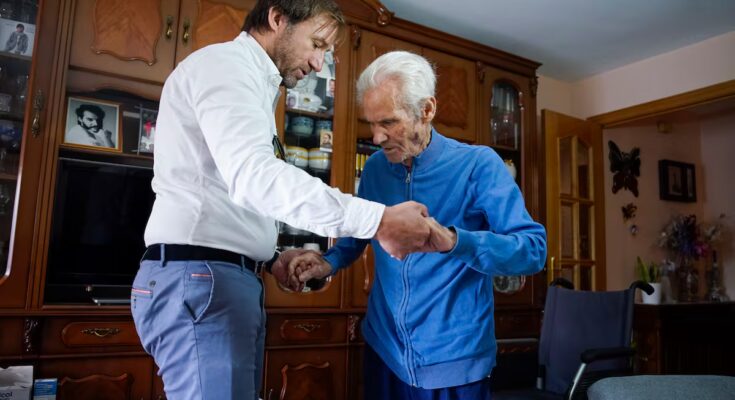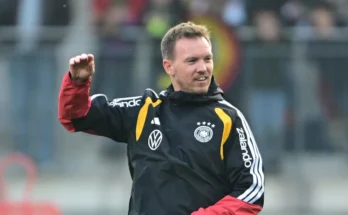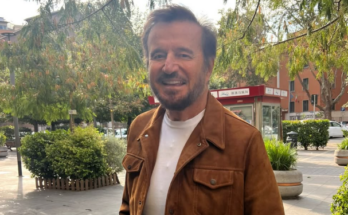Every Friday morning, David Mínguez puts aside his work as an economist and travels through Madrid with a purpose that has little to do with budgets or investments. His destination has changed over the months, but in recent weeks he has parked his motorbike punctually in the Puente de Vallecas neighborhood. On the first floor adjacent to the Cerro del Tío Pío, Domingo, an 89-year-old man who had lived there since the 1980s, when he arrived in the capital from Granada, was waiting for him. Despite barely knowing the driver who parked outside his house, Domingo patiently awaited his arrival to share some time together. A new routine that both appreciated and which will not be able to continue after the death of the Granada man, hospitalized in palliative care due to cancer. Mínguez arrived to accompany him in the last steps of his life. Now he will have to wait a few days to grieve.
The bond that they both began to weave did not arise spontaneously, but within the home support program for palliative care patients of the Spanish Association against Cancer (AECC). “It consists of being there, listening, respecting, connecting,” explains Mínguez, who has been volunteering in this initiative for just over a year. There is no drama in his voice, but the serenity of someone who has learned to look carefully at the fragility of life. “People who are in palliative care face death, and when you do, you realize how you lived. It teaches you to live differently for when your time comes,” he reflects.
Mínguez is 45 years old, from Guadalajara and has lived in Madrid since 2008. Just over two years ago he started as a volunteer in hospital, accompanying people who were hospitalized or who came to receive treatment. “I wanted to do something for others for a long time and the moment never came, until one day I said to myself: this is it. And I started to prioritize it.” He chose the AECC for the enormous incidence of this disease – 13,578 people died of cancer in the Community of Madrid in 2024, according to the Association’s data – and for the “aggressive” nature of the treatments that “leave both patients and their families devastated”.
From that first contact with hospitals – waiting rooms, treatments, long conversations – he went further. «At the beginning, palliative care was an area that gave me a lot of respect», he confesses. “I didn’t have it in mind, but I did some training on it, I really liked it and I called Laura – the program coordinator – to tell her I wanted to participate. Accompanying someone through that phase is the greatest life learning you can have.”
Laura Navarrete is responsible for organizing the approximately 145 volunteers that the AECC has at its disposal to guarantee home accompaniment in the capital. “There are patients who can take a walk, chat, but others cannot. Sometimes accompanying is simply being silent, reading, playing… Being there so that the person notices that closeness. This in itself is an immense task”, he explains, speaking of the work of the volunteers whose profile and motivations are very varied. «We have young people in their 20s and pensioners in their 80s. Some start in other areas of the association and then decide to collaborate in palliative care; others arrive directly because they have experienced a journey like this up close with a family member.”
Deal with the pain
The emotional involvement in accompanying someone in their final stage also forces volunteers to take care of themselves. Therefore, when death occurs, they take a short break (usually two weeks to a couple of months) before getting involved in another case. “It’s important that they have time to compose themselves and reflect on the work done. It’s not about chaining one accompaniment after another,” explains Navarrete about a break that Mínguez will now have to face.
In recent months he has accompanied three people: Onofre, Ricardo and, finally, Domingo. Each story was different; even every goodbye. “With Onofre, being the first, I was quite nervous and waited to see what he was like, what circumstances he was in, what attitude he had… I was lucky that he was a charming person, very open, with a will to live and with an extraordinarily calm head. It was a pleasure, but it didn’t last too short,” he recalls.
“Ricardo was the one with whom I had the most confidence and the one with whom I shared the most time – about a year -. Every Friday we went for a walk and talked about his youth, his marriage, his children and his grandchildren… Never about his illness, just about life.” In those walks, the volunteer discovered something essential: “People who face death, more than fear of dying, are afraid of unfinished business. Of grudges, of what they haven’t forgiven, of what they haven’t said… What everyone wants is to leave in peace.”
Therefore, when asked what he learned, the answer is immediate. “Forgiveness. People rest when they are able to forgive. Even if the other person doesn’t know it or there’s no relationship whatsoever. It’s an internal process.”
Mínguez underlines that the moment of leaving the patient is particularly difficult, as well as not very predictable. “It’s the chronicle of a death foretold because you know he’s about to die, but it’s hard. When Ricardo died I didn’t expect it, I saw him well and with the desire to live. In those moments you think ‘why not one more week’…”, confesses Mínguez, who also didn’t expect to have to say goodbye to Domingo so soon.
Now it’s your turn to take that break. A necessary break so that the volunteers maintain the emotional balance necessary to carry on the accompaniment. A task whose key is to try to help without trying to give advice or offer solutions: “They share with you what their life has been like, their story, and they do it with a different trust than that they have with a friend or family member who already knows them. Being able to tell their life from scratch is a huge relief for them.”
Support for families
When Domingo left his home in Puente de Vallecas at the pace set by Mínguez, who calmly pushed his wheelchair towards Cerro del Tío Pío park, his son observed the scene from the doorway. He did it with a mixture of serenity and gratitude for the time that the volunteer shared with his father, even though he didn’t know him at all.
For him, his presence was also a way of taking care of his mother and brother, who lived with Domingo until his death. Not only by giving them a short break, but also by Mínguez’s interest in knowing how they were doing and offering his help.
Although they had only met three times, trust between patient and volunteer was growing. During his walks around Cerro del Tío Pío, Domingo shared memories that emerged in the park. From building it in the mid-1980s to running after his dog when he was still a puppy. There was also space to remember the moment he left his native Granada and how his children grew up and shaped their lives in this neighborhood in the south-east of the capital.
“It’s a process, but little by little trust is built and the conversation flows more and more. Domingo is grateful to be able to go out for a walk and change the scene,” Mínguez explained days before his death. A mutual gratitude, which means that a person opens the doors of their home to a stranger to share with him the last stage of his life: “He gives me much more than I give, without a doubt”.



